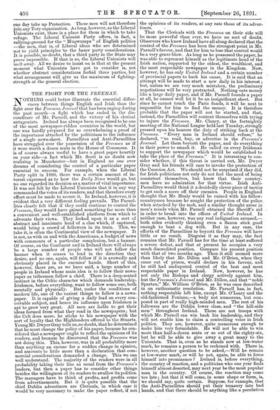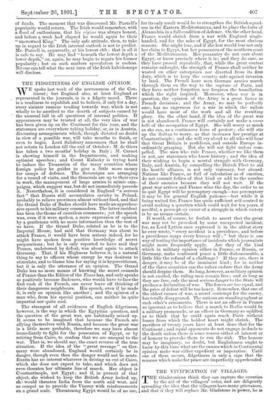THE FIGHT FOR THE FREEMAN. N OTHING could better illustrate the
essential differ- ences between things English and Irish than the fight over the Freeman Journal that has been raging during the past month—a fight which has ended in the dis- comfiture of Mr. Parnell, and the victory of his clerical antagonists. Ireland has always been recognised to be one of the most newspaper-ridden countries in the world, but one was hardly- prepared for so overwhelming a proof of the importance attached by the politicians to the influence of a single news-sheet. Parnellites. and Anti-Paniellites have struggled over the possession of the Freeman as if it were worth a dozen seats in the House of Commons. It is of course always useful to have a great paper heartily on your side—a fact which Mr. Scott is no doubt now realising in Manchester—but in England no one ever dreams of considering the control of a particular paper essential to success. For example, when the Liberal Party split in 1886, there was a certain amount of in- terest expressed as to how the Daily News would go, but no one regarded its decision as a matter of vital importance. It was not felt by the Liberal Unionists that it in any way commanded the votes of its readers, and that therefore every effort must be made to secure it. In Ireland, however, it is evident that a very different feeling prevails. The Parnel- lites clearly felt that if they could continue to control the Freeman, they would have gained something far more than a convenient and well-established platform from which to advocate their views. They looked upon it as a sort of abstract and inanimate head of a clan which, if captured, would bring a crowd of followers in its train. This, we take it, is often the Continental view of the newspaper. It is not, as with us and with the Americans, a budget of news with comments of a particular complexion, but a banner. Of course, on the Continent and in Ireland there will always be a large number of people who will not follow the banner when it ceases to lead in the direction they desire, and no one, again, will follow if it is avowedly and obviously placed in the enemies' hands. Short of this, however, there are, as we have said, a large number of people in Ireland whose main idea is to follow their news- paper as tribesmen follow a chief. There is a deep-seated instinct in the Celtic character which demands leadership. Irishmen, before everything, want to follow some one, both mentally and physically. But, under the conditions of modern life, one of the easiest things to follow is a news- paper. It is capable of giving a daily lead on every con- ceivable subject, and hence its influence upon Irishmen is apt to grow very great. All men are liable to get their ideas formed from what they read in the newspapers ; but the Celt does more, he sticks to his newspaper with the sort of loyalty that the Highlanders offered to the Stuarts. Young Mr. Dwyer Gray tells us, no doubt, that he determined that he must change the policy of his paper, because he con- sidered that a newspaper ought to reflect the opinions of its readers, and because he discovered that the Freeman was not doing this. This, however, was in all probability more than anything an excuse for a sudden change in opinion, and amounts to little more than a declaration that com- mercial considerations demanded a change. This we can well understand. The majority of the readers were in all probability taking their line as usual from the Freeman's leaders, but then a paper has• to consider other things besides the willingness of its readers to swallow its politics. The managers have to think of profits, and profits come from advertisements. But it is quite possible that the chief Dublin advertisers are Clericals, in which case it would be very necessary to make the paper reflect, if not the opinions of its readers, at any rate those of its adver- tisers.
That the Clericals with the Freeman on their side will be more powerful than ever, we have no sort of doubt. Observers who know Ireland have all along declared that the Control of the Freeman has been the strongest point in Mr. Parnell's favour, and that for him to lose that control would be a very grave blow. As long as he possessed the paper, he was able to represent himself as the legitimate head of the Irish nation, supported by the oldest, the wealthiest, and the most respectable newspaper in the Kingdom. Now, however, he has only United Ireland and a certain number of provincial papers to back his cause. It is said that an attempt will be made to start a new daily in his interest ; but, unless we are very much mistaken, the preliminary negotiations will be very protracted. Nothing eats money like a large daily paper, and if Mr. Parnell founds a paper at all, he cannot well let it be an insignificant sheet. But since he cannot touch the Paris funds, it will be next to impossible for him to find the money: It is therefore probable that the paper will not be started, and that, instead, the Parnellites will content themselves with trying to injure the Freeman. Mr. Clancy, at the fortnightly meeting of the National League held last Tuesday, strongly pressed upon his hearers the duty of striking back at the Freeman. " Every man in Ireland should, refuse," he declared, " to read, buy, or advertise in the Freeman's Journal. Let them boycott the paper, and do everything in their power to smash it. He called on every Irishman to support the newspaper which would be established to take the place of the Freeman." It is interesting to con- sider whether, if this threat is carried out, Mr. Dwyer Gray and his friends will care to invoke the protection of the Coercion Act. We should not be surprised if they did, for Irish politicians not only do not feel the need of being consistent • themselves, but know that their country- men have no admiration for that virtue. Irish Anti- Parnellites would think it a decidedly clever piece of tactics to get such a score off their enemies. People in England thought that Mr. Healy would be ruined with his fellow- countrymen because he sought the protection of the police. when attacked by the mob, and a similar thought arose in men's -minds when Mr. Parnell obtained the Sheriff's aid in order to break into the offices of United- Ireland. In neither case, however, was any real indignation aroused,— both sides evidently thinking even a -Saxon stick good enough to beat a dog with. But in any case, the efforts of the Parnellites to boycott the Freeman will have little or no result. Disguise it as they may, the fact remains that Mr. Parnell has for the time at least suffered a severe defeat, and that at present he occupies a very much discredited position. Compare his present position with that of two months ago. Then it still seemed more than likely that Mr. Dillon and Mr. O'Brien, when they came out of prison, would declare in his favour, and he still had undisputed control of the best and most respectable paper in Ireland. Now, however, he has not only the Bishops and clergy actively against him, but the Freeman's Journal and Mr. Dillon, and that " noble Spartan," Mr. William O'Brien, as he was once described in an enthusiastic resolution. Mr. Parnell has, in fact, nothing respectable left him, except Mr. O'Leary and the old-fashioned Fenians,—a body not numerous, but com- posed in part of really high-minded men. The rest of his followers are the Dublin lower class, and " the hill-side men" throughout Ireland. These are not troops with which Mr. Parnell can win back his leadership, and they will not enable him to claim a controlling voice in Irish politics. They are, however, quite numerous enough to make him very formidable. He will not be able to win more than half-a-dozen seats or so out of the eighty-six, but he will be able to give away a great many to the Unionists. That is, even as he stands now at low-water mark, he remains a person to be reckoned with. There is, however, another question to be asked,—Will he remain at low-water mark, or will he not, again, be able to force himself into prominence ? Ireland is, before everything, the country of reaction, and a politician who one year finds himself almost deserted, may next year be the most popular man in the country. Of course, the reaction may come too late; but that it will come, in some shape or form, is, we should say, quite certain. Suppose, for example, that the Anti-Parnellites should put their treasury into bad hands, and that there should be anything like a peculation of funds. The moment that was discovered Mr. Parnell's popularity would return. The Irish would remember, with a flood of enthusiasm, that his regime was always honest, and before a week had elapsed he would again be their " uncrowned King." The only safe attitude, then, to take up in regard to the Irish internal outlook is not to predict. Mr. Parnell is, apparently, at his lowest ebb : that is all it is safe to say. He may find " beneath the lowest depth a lower depth," or, again, he may begin to regain his former popularity ; but on such matters speculation is useless. Ncrone can tell what the next turn of the Irish kaleidoscope will disclose.



































 Previous page
Previous page